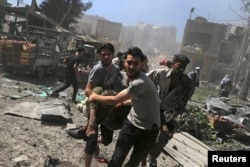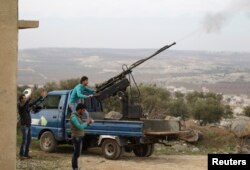The diplomatic pace to try to shape a political solution to the long-running war in Syria will pick up this week, with the French government hosting Western and Mideast foreign ministers Monday in Paris and U.S. Secretary of State John Kerry meeting Russia’s President Vladimir Putin on Tuesday in Moscow.
Developments inside and outside Syria are not helping advance peace. Russian airstrikes and Syrian government barrel-bombing of civilians are hardening rebel sentiment, while regional rivalries complicate the search for peace.
Intense air and missile strikes on insurgent-held Damascus suburbs Sunday killed dozens of people, including children, according to a monitoring group and local rescue workers.
U.S. officials admit they are not “overly optimistic” and doubt a clean settlement to end the conflict is possible. However, they say they have no alternative but to try to find a political solution, and if it fails they will be able to say at least they made the attempt.
Last week, Kerry acknowledged that “kinks” need to be worked out of a negotiating framework agreed to by more than 100 Syrian rebel and opposition groups at a meeting in Saudi Arabia. Western officials expect to start talks next month in Vienna.
Who will be allowed at table?
U.S. officials speaking on the condition of anonymity told VOA the "kinks" involve Russian and Syrian objections over which rebels will be allowed at the negotiating table.
On Friday, Syrian President Bashar al-Assad said he isn’t willing to negotiate with what he dubbed “terrorist groups.”
It isn’t just Assad who is dismissing the deal mediated last week by Saudi Arabia with the highly fractious opposition groups.
The rebel negotiating framework was dismissed Saturday by the leader of Jabhat al-Nusra, al-Qaida’s affiliate in Syria, one of the largest and most influential of insurgent forces in the war-torn country.
Al-Nusra wasn’t invited to the talks in Riyadh. Its leader, Abu Mohamad al-Golani, characterized the Saudi-hosted Syrian opposition conference as “a conspiracy.”
He also denounced last week’s ceasefire in Waer, the last insurgent-held area in Homs City, between the Syrian government and insurgents.
The Waer truce has been touted by U.N. and Western officials as a model to build on to promote a nationwide ceasefire. Nusra Front insurgents rejected the ceasefire and left the city.
Jabhat al-Nusra, which is largely made up of local Syrian fighters, and Ahrar al-Sham, another powerful Islamist faction that pulled out of the rebel talks, are not viewed by rebel factions with the same alarm as by Western governments, and the two groups' tactical thinking holds sway among other militias.
They are seen by most rebel fighters as allies, and their views about the Vienna peace process are not out of step with broad rebel fears about a peace process that may betray their interests, say rebel commanders interviewed by VOA.
Any attempt by Assad officials to pick and choose which rebel groups should participate in Vienna will only fuel insurgent suspicions about the process, warns Andrew Bowen, director of Middle East Studies at the Center for the National Interest, a Washington-based research group.
Conversations Bowen has had with senior Assad officials, including Assad’s chief of staff, prompts his suspicions that Damascus will try to whittle down the participation of rebel militias in the peace talks.
“Since Russia’s intervention and Iran’s stepped up military support for the Syrian government, the thinking of the Assad officials is that they are in a strong position,” he says. “They are not optimistic about retaking a lot of lost territory, but they don’t feel they have to. They believe these negotiations validate Assad and that a deal will be concluded largely on his terms.”
View of process changing
Last week’s opposition meeting in Riyadh marked a shift in Western policy towards many Syrian armed groups, argues Charles Lister, a Mideast analyst with the Brookings Institution.
Speaking last week in Doha at a panel discussion exploring the prospects for the Vienna peace process, Lister said Western powers recognize that despite their ideological conservatism, large rebel militias are “too popular and powerful to be excluded from negotiations,” something the West didn’t accept earlier. The discussion was held at the Brookings Doha Center, which is funded by the Qatari government.
Lister urges the “inclusion of more armed groups among opposition representatives” not less, saying without them a national ceasefire being proposed to accompany talks won’t be possible
Another panelist in Doha shares Lister’s view about the prospects of a negotiated deal coming out of the Vienna peace process. Noah Bonsey, senior analyst on Syria at the International Crisis Group, a Brussels-based research organization, says: “Disagreements on Assad’s future in Syria will undermine the Vienna talks.” He says all the warring parties in Syria believe in the possibility of a military victory, making the war potentially endless.
Russia’s position will be crucial. Some analysts argue Putin is not wedded to Assad remaining as president. All rebel militias and the main Western-backed political opposition group, the Syrian National Coalition, are adamant that Assad must step down and play no role in a transitional government. But Moscow is likely to want to preserve elements of the regime, another likely non-starter for rebel militiamen.














